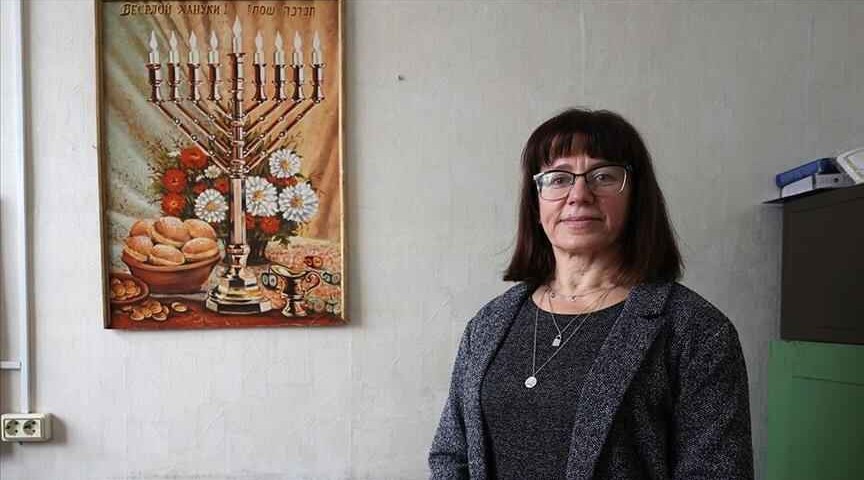Jewish community does not want 'any difficult outcomes' amid tensions in eastern Ukraine
Head of Jewish foundation in Donbas region says community wishes tense atmosphere will not heat up, hope ‘people calm down’

The Jewish community in the Donbas region of eastern Ukraine does not want "any difficult outcomes" amid recent tensions, according to the head of Kramatorsk-based Jewish charitable foundation.
"I wish only peace and that everything be resolved only peacefully so that this atmosphere does not heat up in any case, so that people calm down, so that they continue to live peacefully everyday life, receive happiness, joy from the Sun and peace on Earth," Irına Muravskaya, who leads the Hesed Moria foundation, told Anadolu Agency.
Concerning the Jewish community in the region, Muravskaya said: "They have a reliable support, people are protected from the Jewish side, they are reliably protected."
"We are always ready to lend a helping hand, we still have displaced people (from conflict zone) living here, we try to support them, help pay for housing and purchase food. That is, I would not like any difficult outcomes," she said.
"I would like to wish everyone to live in peace and joy so that everyone is healthy. If there is good health, there will be peace and there will always be a good mood to create miracles and take care of each other. I wish everything be fine with everyone, both in families and in their personal lives, so that children grow up, develop and get maximum pleasure from our civilized world," said Muravskaya.
Commenting on Jewish people staying in areas controlled by pro-Russian separatists, Muravskaya said they are still in touch and support each other remotely.
She said the foundation was founded in 1998, noting that it aims to help the Jewish people and their families who suffered in the Great Patriotic War -- a term used in former republics of the Soviet Union to describe the conflict fought from June 22, 1941, to May 9, 1945, along many fronts of the Eastern Front of World War II, primarily between the Soviet Union and Nazi Germany.
Muravskaya said the foundation provides aid to nearly 300 "wards" -- elderly people, ill or those with disabilities -- in the region, including Druzhkivka, Kostyantynivka, Slavyansk, Lyman, Sviatohirsk, and Kramatorsk.
Coronavirus restrictions caused the foundation to shift events and meetings to an online format.
"In this way, we continue supporting relations in a Jewish spirit," she said.
Muravskaya went on to say that prior to the restrictions, people used to gather in the foundation for different activities, collectively celebrating Jewish holidays in restaurants, as well as gathering for a picnic in nature during the summer.
The Jewish community includes nearly 2,500 people, said Muravskaya, adding that they never managed to gather in big masses for the Jewish events in the city of Kramatorsk.
Despite so many Jewish people living in the region, she said, the nearest synagogue is in the northeastern city of Kharkiv that is about 200 kilometers (125 miles).
"Before (the war), there was (a synagogue in) Donetsk city, but now Donetsk is left on the other side (occupied). Now, people can only go to Kharkiv or Dnipro to perform their prayers. There are also Jewish schools for kids and specialized schools there. There is also a (Jewish) school and a kindergarten in (central city of) Kryvyi Rih," she said.
"Twice a year a synagogue on wheels, called Mitzvah mobile, comes to our city. It may come from any city, either from Kherson or Dnipro, and it passes through small cities as ours, where there are no synagogues," she said.
Muravskaya said Mitzvah mobile is equipped with all required religious attributes and provides opportunities for prayers to Jewish people.
"Jewish rabbis also come and held the prayers and rites," she added.
Jews are supposed to pray three times a day -- morning, afternoon and evening.
Irina Basyk, who has been working for more than 20 years at the foundation, said she is in charge of promoting the “Jewish lifestyle,” which includes organizing cultural events, Jewish holidays, “Shabbats,” library activities, musical events, and “full-fledged lectures.”
“In short, we make leisure time more pleasant for our people,” she said.
Noting they usually gather up to 70 people for Jewish holidays, Basyk said they do not have a lot of activities oriented for the younger generation.
“Youth try to leave the small city of Kramatorsk after graduating from school. They go to Kharkiv, Kyiv, or Dnepropetrovsk to receive a decent education. They try to stay there later on and few people only return back to Kramatorsk,” she said.
Before the occupation of Luhansk and Donetsk by pro-Russian separatists, the community had “bigger events and community centers,” she said.
Then, Basyk said, the events included musical activities, theatre studios, “history of the Jewish renaissance," and other areas.
“Everything was at a big scale and massive,” she said, adding that now the project financing drops every other day.
The recent escalation of tensions “causes great concern, and we all are worried,” said Basyk. “We all are in an optimistic mood and think that everything will be somehow solved in a positive way.”
“We wish peace and pray for that every Friday. We wish peace to our house and peace to our country,” she said.
Ukraine and Russia have been locked in conflict since hostilities in the eastern Donbas region broke out in 2014 after Russia illegally annexed the Crimean Peninsula.
Russia has also recently amassed tens of thousands of troops near Ukraine's borders, prompting fears that the Kremlin could be planning another military offensive against the former Soviet republic.
Moscow has denied it is preparing to invade, saying its troops are there for exercises.
